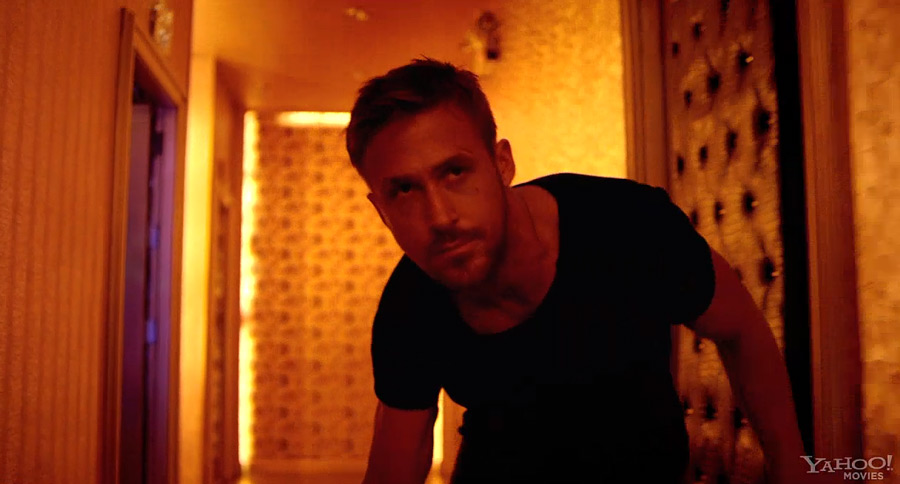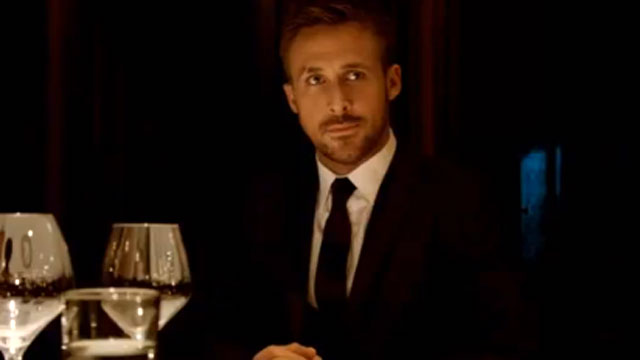|
Only God
Forgives is the
latest film from Danish film director
Nicolas Winding Refn. It also marks his second collaboration with
Hollywood hot
property Ryan Gosling. The plot revolves around Julian (Gosling), who
runs a
boxing club in Bangkok as a front for his drug business. Julian’s
mentally
unhinged brother Billy (Tom Burke) is murdered in retaliation to his
own crime
of brutally murdering a prostitute. This brings the siblings crime boss
mother Crystal
(Kristin Scott Thomas), from the US with the murderous demand that
Julian end
the lives of the people responsible. Their search for revenge leads the
two
Americans through the violent Thai underworld and to a retired
policeman, Chang
(Vithaya Pansringarm). Chang has a severe god complex and the street
level
means to exact it. Neither side will stop until their vengeance is
found in
this visceral and bloody standoff in the backstreets of Bangkok.
Like
all art forms,
film will always be divisive upon individual critical analysis. It’s
this
difference of interpretation that makes the medium so exciting and
varied
throughout the world. Rarely does a film come along though that is
almost
completely polarising in its viewer’s opinions. Only God
Forgives has critics and viewers the world over in split
decision. Some praise Forgives as a
worthy and darker successor to the 2011 Refn/Gosling critical hit Drive. Others believe the
film is an overly indulgent and
excessively violent filmic
insult to viewers and art house cinema in general. In comparison, Drive won the Best Director award at the
2011 Cannes festival, while Only God
Forgives was booed by the audience at the 2013 Cannes premier.
Australian
audiences had the opportunity to see this film early as a part of the
Sydney
film festival this year, and it proved to be a hit with the judges. The
film
took out the top prize as festival winner (a second time for Refn, who
previously won with Bronson in 2008),
but was still divided within the audience and critical opinion.

Those
that didn’t
enjoy Drive should avoid this film
without question. Both films are made within similar aesthetics.
Unfortunately, Only God Forgives brings nothing new
or creative to the previously winning formula. Others that have been
eagerly
awaiting this actor/director follow-up should put their hopes on hold
and lower
their expectations. Gosling does little to dispel his doubters with the
role of
Julian. With only a miniscule amount of dialogue to work with his
performance
is completely dull and unfortunately directed to be so inexpressive.
His
uninteresting and underdeveloped character is often prone to violent
outbursts
against both sexes. Combining these factors make the role hard to
relate to and
ultimately, completely unexciting in delivery.
The
early promise
the actor showed in films like Half
Nelson (2006) and Lars and the Real
Girl (2007) seems to be washing away in river of non-challenging
roles
designed to keep him on the top of the Hollywood A-list. His role in Gangster Squad (2013) was dull and his
character in Crazy Stupid Love (2011)
was a vacuous walking advert for unaffordable clothes. While The Place Beyond the Pines (2013) was a
well constructed, ensemble crime drama,
Gosling’s character was almost identical in nature and poise to his
work in Drive. Those hoping for a solid (or even
slightly different) performance from the actor in Only God
Forgives will not get it. Kristin Scott Thomas has
received praise for her work as Crystal, with many critics saying hers
is the
role that holds this film together. She does bring a confidence within
the cold
confines of her role, but it is not enough to keep the film afloat or
involving. Pansringarm is a perfect choice for the character of Chang
and
adequately chilling, despite the simplistic direction he was given. It
would
have been interesting to see this main cast stretch their acting legs,
by
having more dialogue and freedom to act within a larger spectrum of
emotions.

Much
has also been
said about the style and production design in Only God
Forgives. Saturating the film in red across the lighting
and set design suits the primal and dangerous mood of the film.
However, it is
also a typical and uninteresting visual approach, especially
considering this
film was shot on location in a country that has a lot more to offer on
a
large-scale screen. Through these faults, the one thing that truly
keeps this
film down is the pacing. Writer/director Refn gives himself no room to
move
with an incredibly thin script (the character of Julian has only
seventeen
lines for the duration of the film). Choosing instead to flesh the
piece out
with overly long takes and colour washed homicidal looks from Gosling.
The
cinematography is compelling at first, but after the first half hour
there is
nothing new or surprising.
For a
film of this
visual nature it is a further disappointment in the overall directorial
execution.
At a very short running time of only an hour and a half, it is a
telling fact that
the film feels like such a labored viewing experience. Refn has chosen
to
dedicate the film to Chilean born, Avant-garde director Alejandro
Jodorowsky: a
personal icon for the director and a go-to director for the uptight
over
referencing cinema buffs. His body of work and approach to cinema seems
at odds
with everything on offer with this film. The El Topo
(1970) director was actually at the Cannes film festival
this year. Upon seeing DiCaprio on the poster for The
Great Gatsby he exclaimed to one interviewer: “Prostitution! He
should be ashamed.” So what would he think of a film of this ilk being
dedicated to him in artistic respect? One can only wonder.

Refn
came up with
the idea of “a man who wants to fight god” while going through a
difficult
second pregnancy with his wife. While this powerfully bizarre notion is
an
interesting idea, the cinematic manifestation of this concept seems
strangely
wayward. Forgives carries an
incredibly dark tone of both physical and sexual abuse. These are
powerful
themes that can make for gripping cinema, but Refn seems to simply toy
with
them without justified cause or proper implementation. Using these
themes
simply as character hooks do help explain the darker nature of the
characters,
but without any other layering in the script it is a cheap and immature
direction to take. This leaves the more observant
viewer
experiencing a falsity of human depth throughout the film. The end
result for Only God Forgives leaves the director’s
original concept too submerged within his individual style, especially
for such
an existential idea to really be a true backbone for the senselessness
that
protrudes from every neon lit corner of this film.
|